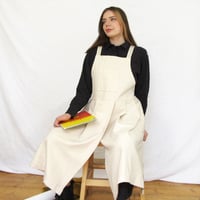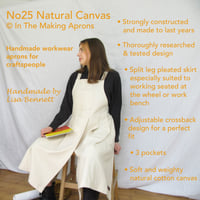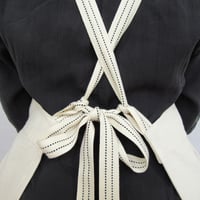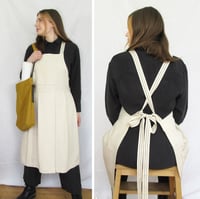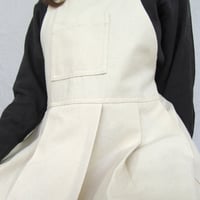Split Leg Pleated Pinafore Apron with Adjustable Crossback Straps. No25 Undyed Canvas
Striking and unusual workwear design, inspired by artists’ smocks and Victorian trade aprons, reimagined for modern artists and makers with a combination of specialist features. A fully pleated skirt and split leg design provides generous coverage and comfort particularly when seated at a workbench or potters wheel. The apron is made from thick softly draping undyed cotton canvas, which has tiny flecks of cotton seed visible in the weave. Adjustable cross back straps ensure a perfect fit whether that’s snug or easy-fit, choose from ecru cotton with decorative lines of black dots or Royal blue. Finally there’s a good size bib pocket and two skirt pockets to stow tools and phone.
This apron is highly specialised and professional craftsperson's workwear - designed, in collaboration with potters/ceramicists, and handmade by artist-workwear expert Lisa Bennett at 'In The Making - Aprons' design studio.
KEY FEATURES: Natural undyed cotton canvas - heavyweight • Excellent coverage • Split leg pleated skirt • Adjustable cross back design, straps knotting through loops at the back • 2 skirt pockets & big bib pocket double stitched for strength • Wide size range & good fit • Strongly constructed • Thoroughly researched & tested design • Sustainable making - This apron was NOT made in a factory! • Handmade by Lisa Bennett at 'In The Making - Aprons •
SIZE: UK8-18 (US6-14). MEASUREMENTS: 96cm long bib top to hem, width at waist 79cm, skirt length 67cm from bib waist. (Model UK10/12, 5'7"/170cm)
FABRIC & CARE: 100% cotton canvas (Oeko-Tex 100 certified). Cotton woven herringbone tape. Machine washable 30C, slow spin. Do not tumble dry.
INTERNATIONAL POSTAGE:
** Local state/customs taxes may be payable in some countries
***Multiple orders (International destinations) may be sent in separate packages (because Royal Mail only insure up to £250) or occasionally in one package via UPS when that's more economical.
****USA postage costs have increased because they now include the new US customs tariff for UK goods which is 10% of the item price.
ABOUT: This No25:1 design came about from requests from clients who loved the pleats of the No14:2 apron but wanted an easy-fit crossback style. It took several years to complete this design including experimenting with different fabrics which offer a softer drape than the slightly stiffer canvas I normally use.
Working in my studio in hilly-leafy South-East London, I design and make workwear aprons using fabrics that are natural, washable and durable. Careful attention to detail, strength of construction and beautiful stitching result in a quality of finish simply not possible in mass production. I cut fabric economically, minimising waste and saving the small remnants to make one-of-a-kind bags for my ‘Boro Collection’.
